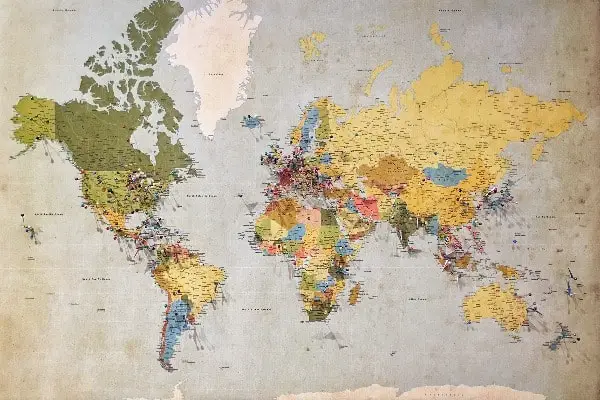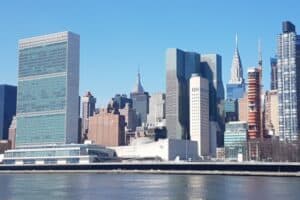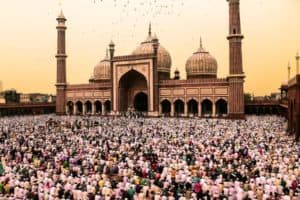This page contains affiliate links. This means if you a follow a link and make a purchase, at no additional cost to you, Humanitarian Careers will receive a commission. Thank you for supporting the site.
As one of the most famous and recognisable entities in the world, the United Nations is a truly global institution. The UN has many special legal powers and has authorities that many other international bodies don’t. However, this raises a few questions – is the UN the same as a country? Does the UN rule over a nation and what is the difference between the UN and a country?
The United Nations is not a country. The UN does not have territory, a population or its own government. It is an international organization made up of member states that aims to establish a set of norms and rules to improve international relations.
Ok, so that’s an overview, now let’s go a bit deeper…
Why The United Nations Is Not A Country?
The United Nations is a significant global force. The UN has operations all over the world. However, although the UN has immense global influence, it is not its own country. Here a few reasons why:
- The UN does not occupy a territory
- The UN does not have a population
- The UN does not have a government
Let’s look at each of these in some detail…
The UN Does Not Occupy A Territory
The first reason why the United Nations is not a country is because it is not a set territory with defined borders. Countries are established areas of land that have internationally recognized boundaries. The UN is an international organization and it has offices in many countries. However, it does not have a set territory or location which it controls.
Although the UN Headquarters in New York is technically in an international zone, it does not mean the UN is its own country. The area of the UN HQ is officially overseen by the United Nations, and not the US. However it almost entirely comes under US law and does not constitute an independent country in its own right.
The UN Does Not Have A Population
The second reason why the United Nations isn’t a country is because it does not have a population. All countries contain people that live together within its borders and are subject to the same laws. This does not apply to the UN. Nobody is a citizen of the United Nations and there is no one group of people who live within an area ruled by the UN.
One thing people often mistake about the UN in relation to it having citizens is the UN passport. This is called a UN laissez passer (UNLP). It is a passport issued to UN staff that allows them to travel for official United Nations work. However, the UNLP does not make you a citizen of the United Nations and does not relate to the UN being a country.
The UN Does Not Have A Government
The final reason why the United Nations is not a country is because it is not a government. The UN does not pass laws which a population must follow. It also does not tax or police a set group of people as a country would.
Although the United Nations structure can look like that of a government, it is not. UN resolutions are not international law and countries are not forced to follow them. The UN is not the government of a defined area and this is a major reason why it is not a country.
Could The UN Become a Country?
So, it’s clear the United Nations is not a country, and why. However, if the global situation changed and the UN was given more power, could we ever see the UN declared as an independent country?
The United Nations will never become an independent country. For this to happen the UN would need to acquire territory that it would govern. The United Nations is an international organization, it is not possible for it to ever be a nation state.
Nations come into existence in several ways – through independence struggles or conquest of land for example. However, for a country to officially exists it must be internationally recognised, with sole authority over its territory. The United Nations could not become a country because, as an international organisation, it could not do this.
No country in the world would support the UN becoming an independent state. This is another reason why the UN will never become a country.
United Nations Online Courses
If you want to learn more about the United Nations, and why it is not a country, we highly recommend the online course Global Diplomacy: The United Nations in the World offered by SOAS in London. We think it provides one of the best overviews of the UN and its role in the current global order. SOAS is also one of the top universities in the world for international relations and courses related to the UN. Click the link for more information.
The Sustainable Development Goals (SDG) underpin all of the UN’s work. In order to fully understand the United Nations, and why it is not a nation state, you need a basic understanding of the SDG. We think the online short course The Sustainable Development Goals – A Global, Transdisciplinary Vision For The Future offered by the University of Copenhagen is one of the best introductions to the SDG. Follow the link to the course’s page.
The University of Leiden in the Netherlands offers an online short course on The Changing Global Order. It includes a specific look at how shifting international power dynamics are affecting the current global system and the United Nations. For those wanting to understand the challenges the UN faces, this online course is a must. We’ve linked to the course’s page.
What Country Is The United Nations In?
Ok, so it’s clear the UN is not a country. We’ve also gone over why it is not a nation state and why it will never become one. However, the UN must physically be somewhere, even if it not an independent country. So, which country is the UN actually in?
The headquarters of the UN is in New York, USA. This is where the UN General Assembly and Security Council is located. The UN also has subsidiary HQs in Vienna Austria, Geneva Switzerland, and Nairobi Kenya.
Alongside the main HQ and sub-HQs, the UN also has 15 specialized agencies which have their headquarters in many different countries. The UN works in 193 countries and has offices in each of these coordinating activities.
Although the UN is headquartered in America, in fact the United Nations is spread across many locations.
As we’ve said, alongside having the main HQ in New York and the HQs of the UN agencies spread across many different countries, the UN and its agencies also have offices in member states. These coordinate specific activities and liaise directly with local governments.
The UN headquarters in New York is located in an international territory, and technically is not located in the United States. An treaty between the US government and the UN established the extraterritorial status of the UN’s HQ in 1947. However, the UN HQ does abide by most state and federal US laws.
The status as an international territory is unique to the UN’s headquarters in New York. Other UN offices are not located extraterritorially and are officially located in the country they are in.
Is The United Nations A Confederation?
Right, so we’ve established the United Nations is definitely not a country and won’t become one. We also know where the UN is based and legally how this works. So, if the United Nations is not a country, could it be a confederation?
The United Nations is an example of a confederation. The UN is union of sovereign nations that are bound together by treaties. As an international organization, the UN oversees interactions between states, whilst allowing members to remain fully independent
To fully explore this, we need to understand exactly what a confederation is. Encyclopedia Britannica defines a confederation as:
‘’primarily any league or union of people or bodies of people. The term in modern political use is generally confined to a permanent union of sovereign states for certain common purposes’’
Encyclopedia Britannica, 2022
Importantly, the United Nations is an international organization, and not a formal confederacy. Although the UN can be an example of a confederacy, and there are many similarities between Confederalism and intergovernmentalism, the technical definition of the UN is an inter-governmental organization.
With that said, in many ways the definition of a confederacy applies to the United Nations. All UN member states retain their sovereignty. They have full control over key aspects of their governance including political system, defence, currency and foreign relations. The UN is an international body that binds nations together in a framework that allows countries to work more effectively together.
Another key way that the UN is a confederation is that in a confederation the central body does not have the right to force members to enact it’s will. This is an important way that a confederation differs from a federation. The UN cannot force members states to take action and cannot pass laws that directly impact the citizens of members states.
A further key way that the United Nations is a confederacy is that states retain the right to seceded. As country within a confederacy remain sovereign, they implicitly hold the right to leave. Countries are technically free to leave the United Nations. However, no country has fully gone through with exiting the UN.
If you want to learn more about the United Nations, and why it is not a country, explore our list of the top UN online courses here.





